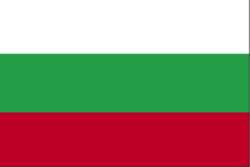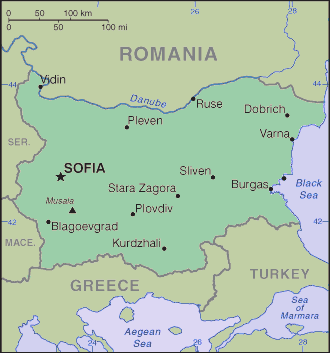Traveling Luck for Bulgaria. Bulgaria, Europe
Bulgaria is located in Southeastern Europe, bordering the Black Sea, between Romania and Turkey.
Land in Bulgaria is mostly mountains with lowlands in north and southeast.
Bulgarian land covers an area of 110910 square kilometers which is slightly larger than Tennessee
Bulgaria has borders with Greece for 494km, FYR Macedonia for 148km, Romania for 608km and Turkey for 240km.
 Bulgarian national flag (Flag of Bulgaria)
Bulgarian national flag (Flag of Bulgaria)
As for the Bulgarian climate; temperate; cold, damp winters; hot, dry summers.
Bulgarian(s) speak Bulgarian 84.5%, Turkish 9.6%, Roma 4.1%, other and unspecified 1.8% (2001 census).
Places of note in Bulgaria
- Sofia
- Plovdiv
- Varna
- Burgas
- Ruse
- Stara Zagora
- Pleven
- Sliven
- Dobrich
- Shumen
- Pernik
- Yambol
- Khaskovo
- Pazardzhik
- Blagoevgrad
- Veliko Tŭrnovo
- Vratsa
- Tonchevtsi
- Vidin
- Asenovgrad
- Kyustendil
- Montana
- Dimitrovgrad
- Lovech
- Silistra
- Razgrad
- Tŭrgovishte
- Dupnitsa
- Svishtov
- Smolyan
- Petrich
- Samokov
- Lom
- Sandanski
- Sevlievo
 Bulgarian map
Bulgarian map
Regions of Bulgaria
- Blagoevgrad
- (BU29)
- (BU30)
- (BU31)
- (BU32)
- (BU33)
- (BU34)
- (BU35)
- (BU36)
- (BU37)
- Bulgaria (general)
- Burgas
- Dobrich
- Gabrovo
- Khaskovo
- Kŭrdzhali
- Kyustendil
- Lovech
- Montana
- Pazardzhit
- Pernik
- Pleven
- Plovdiv
- Razgrad
- Ruse
- Shumen
- Silistra
- Sliven
- Smolyan
- Sofiya
- Sofiya-Grad
- Stara Zagora
- Tŭrgovishte
- Varna
- Veliko Tŭrnovo
- Vidin
- Vratsa
- Yambol
The Bulgars, a Central Asian Turkic tribe, merged with the local Slavic inhabitants in the late 7th century to form the first Bulgarian state. In succeeding centuries, Bulgaria struggled with the Byzantine Empire to assert its place in the Balkans, but by the end of the 14th century the country was overrun by the Ottoman Turks. Northern Bulgaria attained autonomy in 1878 and all of Bulgaria became independent from the Ottoman Empire in 1908. Having fought on the losing side in both World Wars, Bulgaria fell within the Soviet sphere of influence and became a People's Republic in 1946. Communist domination ended in 1990, when Bulgaria held its first multiparty election since World War II and began the contentious process of moving toward political democracy and a market economy while combating inflation, unemployment, corruption, and crime. Today, reforms and democratization keep Bulgaria on a path toward eventual integration into the EU. The country joined NATO in 2004.
Bulgaria, a former communist country striving to enter the European Union, has experienced macroeconomic stability and strong growth since a major economic downturn in 1996 led to the fall of the then socialist government. As a result, the government became committed to economic reform and responsible fiscal planning. Minerals, including coal, copper, and zinc, play an important role in industry. In 1997, macroeconomic stability was reinforced by the imposition of a fixed exchange rate of the lev against the German D-mark and the negotiation of an IMF standby agreement. Low inflation and steady progress on structural reforms improved the business environment; Bulgaria has averaged 4% growth since 2000 and has begun to attract significant amounts of foreign direct investment. Corruption in the public administration, a weak judiciary, and the presence of organized crime remain the largest challenges for Bulgaria.
Bulgarian natural resources include bauxite, copper, lead, zinc, coal, timber, arable land
strategic location near Turkish Straits; controls key land routes from Europe to Middle East and Asia
Bulgarian religion is Bulgarian Orthodox 82.6%, Muslim 12.2%, other Christian 1.2%, other 4% (2001 census).
Natural hazards in Bulgaria include earthquakes, landslides.
Travel Advice for Bulgaria
BulgariaSUMMARY
- Bulgaria shares with the rest of Europe a threat from international terrorism. Attacks could be indiscriminate and against civilian targets.
- The main types of incident for which British nationals require consular assistance in Bulgaria are for involve petty crime, replacing lost or stolen passports and car theft. You should be aware of young pickpockets in city centres especially in crowded areas e.g. buses, trains and busy streets. Keep valuable belongings in a hotel safe where possible.
- British citizens holding valid passports can enter Bulgaria for up to three months without requiring a visa. However, we area aware of cases where individuals entering Bulgaria without a visa on “British subject” passports being refused entry. If you are in any doubt you should contact the Bulgarian Embassy in London before you travel. Please see the Entry Requirements section of this travel advice for more details.
- You should carry a copy of the information pages of your passport at all times as proof of identity.
- We strongly recommend that you obtain comprehensive travel and medical insurance before travelling. You should check any exclusions, and that your policy covers you for the activities you want to undertake. Please see: Travel Insurance.
SAFETY AND SECURITY
Political Situation
Country Profile: Bulgaria.
If you enter Bulgaria in a private vehicle, you must have your driving licence, all original registration and ownership documents (including logbook) as well as evidence of insurance valid in Bulgaria. If you have hired a car you must have the original contract document, which should state that the vehicle can be brought into Bulgaria. Border officials will impound your vehicle if they are not satisfied that you won it or have permission to use it in Bulgaria.
Since January 2005, tolls have been charged on motorways and main rods out of town. These are payable in Euros. The rate for cars is currently five Euros for a one-week vignette and 12 Euros for one month. Rates are much higher for freight vehicles and coaches for eight or more passengers. Vignettes can be purchased at ports and border points, and are also available for post offices and DZI bank offices. You will be fined if you do not carry the appropriate vignette.
If your vehicle is stolen while you are in Bulgaria, you will be considered liable for import duty and related taxes. If you cannot pay, you will have to sign a declaration on departure confirming that you will pay the due amount. We strongly recommend that, if possible, you take out insurance to cover this.
Some criminals are reported to impersonate traffic policemen to flag vehicles down on major routes, especially near international border crossings. If you are crossing Bulgaria by car, you should try to travel in daylight hours.
LOCAL LAWS AND CUSTOMS
The Bulgarian authorities treat all drug-related (including possession) and or sex offences very seriously (the age of consent is 16). Custodial sentences can be expected for any foreigners convicted of such offences. Offences relating to drunken, disorderly behaviour and hooliganism may also be treated more seriously than in the UK.
Homosexuality is no longer illegal, but Bulgarians tend not to be very open about the subject and the gay community generally keeps a low profile. There are a few gay bars and clubs in Sofia and, to a lesser extent, in other major towns in Bulgaria.
Be careful if you are taking photographs in security-sensitive areas such as airports. If in doubt, ask permission.
ENTRY REQUIREMENTS
Please note that British subjects, e.g. of Irish descent and born before 1 January 1949, must obtain a visa from the Bulgarian Embassy in London prior to any visit to Bulgaria. Failure to do so will mean that you will be refused entry. If your passport classifies you as anything other than a British citizen you should contact the Bulgarian Embassy in London before you travel to see if you need a visa.
HEALTH
Avian Influenza (Bird Flu)
There was a confirmed case H5N1 Avian Influenza in wild birds in the Vidin area in the north-western region of Bulgaria in the summer of 2006. No human infections or deaths have been reported.
You should read this advice in conjunction with the FCO’s Avian and Pandemic Influenza Factsheet, which gives more detailed advice and information.
NATURAL DISASTERS
Bulgaria regularly experiences earth tremors. These are normally relatively minor (up to 4.5 on the Richter Scale) and do not have any major impact on the country
GENERAL
Money

 Search
Search Bulgaria country profile
Bulgaria country profile Travel advice for Bulgaria
Travel advice for Bulgaria